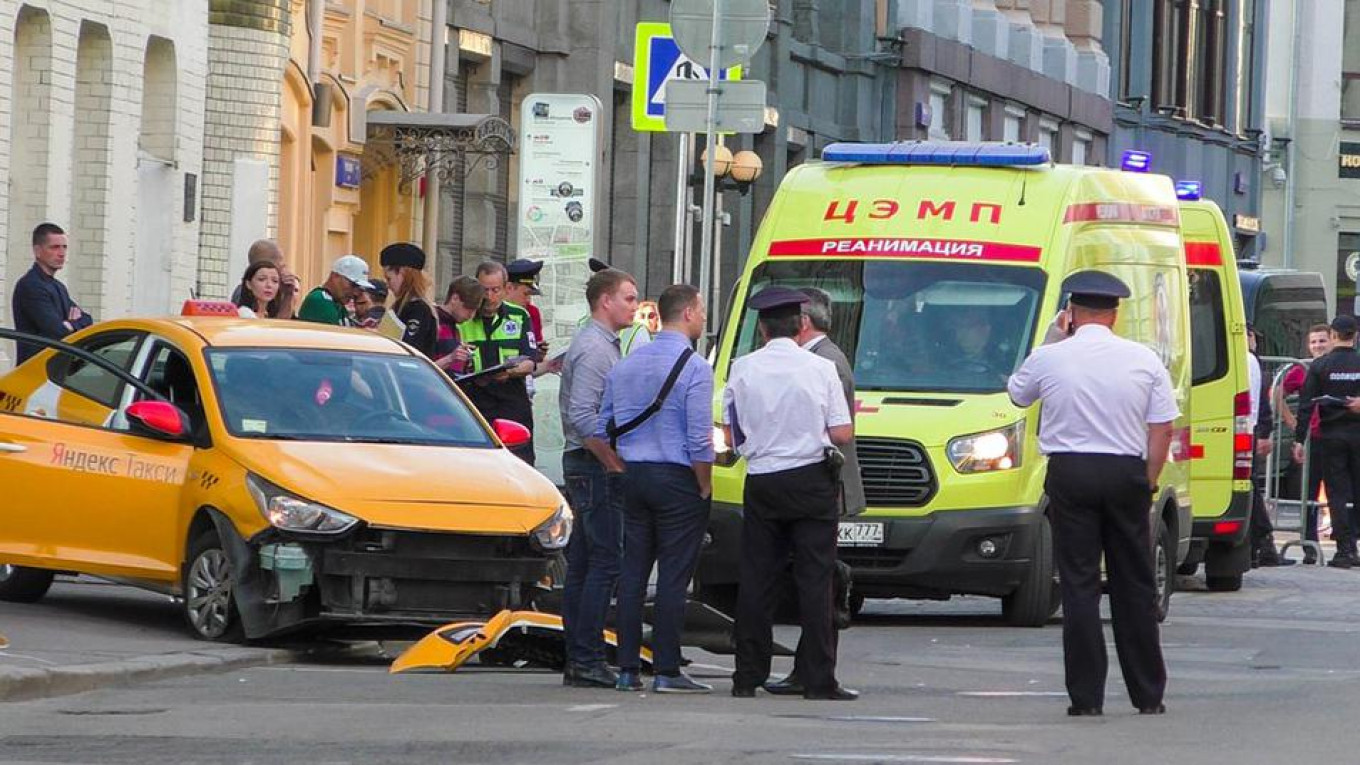A driver loses control of his taxi and mounts the pavement, injuring eight people. Is this world news? It is when it’s in Moscow during the World Cup. Being in the spotlight, especially where safety issues are concerned, has driven an unprecedented security campaign in Russia, the effects of which will linger long after the closing ceremonies.
According to Moscow Mayor Sergei Sobyanin, the driver fell asleep at the wheel. However, the news that he was from Kyrgyzstan briefly raised the specter of terrorism. This is not the message the Kremlin wants outsiders to hear.
Although the U.S. State Department has played up the terrorist threat, most Russian cities are safe. A massive operation has been under way to ensure security during the tournament.
The police and National Guard have been drafted in to provide extra officers at the World Cup host cities, buttressed by private security and Cossacks. Moscow and other cities have sprouted concrete obstacles around their pedestrianized areas to prevent vehicular terrorism.
Close-circuit cameras, already common in Russia, have become increasingly visible. Many are high-resolution cameras connected to state-of-the-art facial recognition software that can flag known terrorists or hooligans.
Much is also happening behind the scenes. For months beforehand, the police and the Federal Security Service (FSB) quietly assembled lists of known hooligans and suspected terrorist sympathizers. Many have been detained, confined to their hometowns or encouraged to leave the country for the tournament.
The FSB has also been enthusiastically reviving the practice of the “prophylactic chat.” Other suspected trouble-makers are simply called in for a conversation to let them know the state has its eye on them. Refined by the old KGB under their chief Yury Andropov in the 1970s, this is a surprisingly efficient way of warning off all but the most dedicated or foolhardy.
Similarly, senior figures within the vorovskoi mir, or “thieves’ world," have been warned that the state would be unhappy if foreign fans were to face serious problems. Earlier in the year, for example, the gang leader known as “Kvezhoyevich,” whose group is especially involved in organized pickpocketing rings in Moscow, was arrested and warned off targeting the visitors.
Meanwhile, electronic surveillance has also been kicked into high gear. The unique identities of mobile phones are logged as they enter and leave the metro system. Texts, messages and e-mails are intercepted and analyzed by programs looking for keywords, phrases or suspicious correlations. All these have been in place for some time — and are hardly unique to Russia — but reports suggest the net is especially fine and has been cast wide during the World Cup.
Of course, none of this can guarantee security, whether from a determined attacker or, as the taxi incident demonstrated, bad luck. Nonetheless, it does show how serious the Kremlin is about doing everything it can to ensure the tournament runs smoothly.
But this extraordinary level of effort cannot be sustained. Already, cities and regions which have been emptied of their police to secure the tournament are expressing concern about their own crime rates. Likewise, the FSB and other security agencies are working flat out and cannot maintain the same pace forever. Once the World Cup is over, we can expect to see a scaling down of the campaign.
For all that, though, there will be a legacy, and a mixed one for Russia. Extra spending on law enforcement and urban security measures will carry forward and be especially useful for venue cities such as Rostov-on-Don, Volgograd and Yekaterinburg, which have needed something of an assist.
However, if the more intrusive campaign of “prophylactic chats,” local confinement and unofficial intimidations are also deemed successful, the temptation will be to adopt them more generally. Russia may gain a better reputation abroad while losing even more of its freedoms at home.
Mark Galeotti is Senior Fellow at the Institute of International Relations Prague and author of “The Vory: Russia’s super mafia.” The views and opinions expressed in opinion pieces do not necessarily reflect the position of The Moscow Times.
A Message from The Moscow Times:
Dear readers,
We are facing unprecedented challenges. Russia's Prosecutor General's Office has designated The Moscow Times as an "undesirable" organization, criminalizing our work and putting our staff at risk of prosecution. This follows our earlier unjust labeling as a "foreign agent."
These actions are direct attempts to silence independent journalism in Russia. The authorities claim our work "discredits the decisions of the Russian leadership." We see things differently: we strive to provide accurate, unbiased reporting on Russia.
We, the journalists of The Moscow Times, refuse to be silenced. But to continue our work, we need your help.
Your support, no matter how small, makes a world of difference. If you can, please support us monthly starting from just $2. It's quick to set up, and every contribution makes a significant impact.
By supporting The Moscow Times, you're defending open, independent journalism in the face of repression. Thank you for standing with us.
Remind me later.








